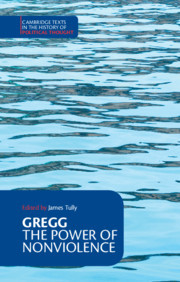The Power of Nonviolence Cambridge Texts in the History of Political Thought Series
Langue : Anglais
Auteur : Gregg Richard Bartlett
Coordonnateur : Tully James

This definitive edition of the 1959 classic text includes a major new introduction by a leading political theorist, James Tully.
The Power of Nonviolence, written by Richard Bartlett Gregg in 1934 and revised in 1944 and 1959, is the most important and influential theory of principled or integral nonviolence published in the twentieth century. Drawing on Gandhi's ideas and practice, Gregg explains in detail how the organized power of nonviolence (power-with) exercised against violent opponents can bring about small and large transformative social change and provide an effective substitute for war. This edition includes a major introduction by political theorist, James Tully, situating the text in its contexts from 1934 to 1959, and showing its great relevance today. The text is the definitive 1959 edition with a foreword by Martin Luther King, Jr. It includes forewords from earlier editions, the chapter on class struggle and nonviolent resistance from 1934, a crucial excerpt from a 1929 preliminary study, a biography and bibliography of Gregg, and a bibliography of recent work on nonviolence.
Acknowledgments; Chronology; The works of Richard Bartlett Gregg; Editor's introduction: integral nonviolence; Bibliography; Preface to the 1934 edition Richard Bartlett Gregg; Foreword to a Discipline for Nonviolence 1941 Mohandas Gandhi; Foreword to the 1944 edition Rufus Matthew Jones; Preface to the 1944 edition Richard Bartlett Gregg; Foreword to the 1959 edition Martin Luther King, Jr; Preface to the 1959 edition Richard Bartlett Gregg; Preface to the 1960 Indian publication of the 1959 edition Richard Bartlett Gregg; 1. Modern examples of nonviolent resistance; 2. Moral Jiu-Jitsu; 3. What happens; 4. Utilizing emotional energy; 5. How is mass nonviolence possible?; 6. The working of mass nonviolent resistance; 7. An effective substitute for war; 8. The class struggle and nonviolent resistance; 9. Nonviolence and the state; 10. Persuasion; 11. The need for training; 12. Training; Notes by chapter; Index.
James Tully is Professor Emeritus at the University of Victoria, Canada. His works include An Approach to Political Philosophy: Locke in Contexts (Cambridge, 1993), Strange Multiplicity: Constitutionalism in an Age of Diversity (Cambridge, 1995), Public Philosophy in a New Key, 2 volumes (Cambridge, 2008), On Global Citizenship: James Tully in Dialogue (2014), and Nichols and Singh, editors., Freedom and Democracy in an Imperial Context: Dialogue with James Tully (2014). He is a Fellow of the Royal Society of Canada, Emeritus Fellow of the Pierre Elliott Trudeau Foundation, and recipient of both the Killam Prize in the Humanities (2012) and the C. B. MacPherson Prize for Public Philosophy in a New Key. He was co-editor of the Cambridge University Press 'Ideas in Context Series' for twenty years.
Date de parution : 11-2018
Ouvrage de 304 p.
13.8x21.5 cm
Date de parution : 11-2018
Ouvrage de 304 p.
14.2x22.2 cm
Disponible chez l'éditeur (délai d'approvisionnement : 14 jours).
Prix indicatif 92,80 €
Ajouter au panierThème de The Power of Nonviolence :
© 2024 LAVOISIER S.A.S.



